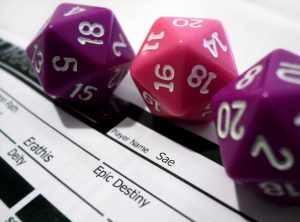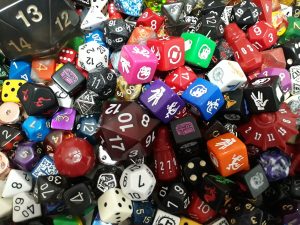Photo by Sandra Ahn Mode on Unsplash
Table of Contents
If you’re into fantasy and games (just like I am!), Dungeons and Dragons is one of the most fun things you can do. That’s because it combines both those amazing elements, weaving gameplay traits and fantasy seamlessly together.
The problem is, unless you know a dedicated group of players that’s willing to welcome you into their group, getting started can be difficult. This is particularly true if you live somewhere with a smaller population.
Even if you manage to scrape together a group of people, there’s a chance they might all be beginners. What do you do then when there are several different editions of D&D to choose from? Which is the best D&D edition for beginners?
The goal of this article is to help answer that question for you. Because I like to go the extra mile, I’ll also be answering a few additional questions on top of that. Let’s get this show on the road, shall we?
Best D&D Edition for Beginners

The number of D&D editions available honestly depends on where you’re located. If you’re in the United States, you’ll have around eight different editions to choose from. I’m using the word “edition” kind of loosely here, because some of those versions made minor or even just cosmetic updates to previous versions.
Nonetheless, this can make things confusing for those who are new to the game. More choices can be great, but it can also be overwhelming.
I’ll cut to the chase. Ask any veteran player, and they’ll give you the same answer: fifth edition, also known as DnD 5e, is the best for beginners. There are a few reasons why this is the case.
First, the basic concepts of the game are described very early on in the Player’s Handbook. Second, the books use beginner-friendly language that won’t leave you scratching your head. Third, many 5e players feel that it’s incredibly simple to learn.
Put briefly, you should consider going with 5e if you’re in a group of beginners.
Beginner D&D FAQs
What should I bring to my first D&D session?

What you should bring to your first-ever D&D session varies based on how you play it. Many of the “tools of the trade,” so to speak, can be translated into tons of free tools online, like dice rollers and virtual character sheets.
You can even play the game completely virtually on sites like Roll20 or through programs like Discord. In those situations, you probably don’t need to bring anything at all – just sit at your computer, put on a headset, and maybe sip on a drink.
Let’s assume that you’re playing the traditional paper and pencil way, though, and that you’re meeting a group of players. Here’s what I recommend having with you:
- Your character sheet
- A mixture of dice (D20s, D10s, D6s, D8s, etc.)
- A writing utensil (probably a pencil)
- The Player’s Handbook
- A miniature of your character (if your group is using a map and minis)
- A spare notebook for note keeping
Things get a bit more complicated if you’re running the sessions. As the DM, you’ll need to have more equipment than your players. Here’s what I recommend bringing if you’re a first-time DM:
- A mixture of dice
- A pencil
- The Player’s Handbook (it’s best to have your own copy as the DM, so you don’t need to take it from your players every time there’s a question)
- Supplemental books (including the Dungeon Master’s Guide and possibly the Monster Manual)
- A tiled map that you can use for minis (if your group is using a map and minis)
- Minis for NPCs and monsters
- A DM screen to shield hidden rolls from players and keep essential rules at hand for quick reference
- Your session notes, if applicable
Where should I start in D&D?
I’ve written a starting guide to Werewolf: the Apocalypse, and I feel like many of the concepts apply to starting a game of Dungeons and Dragons. I’ll cover some of the basics here again, though.
You’ve already done some of the legwork once you’ve chosen which edition of Dungeons and Dragons you’re playing. Your next step is to actually acquire the books. I’ll include links to where you can buy them on the bottom of this page.
The Player’s Handbook is an excellent starting point. Ideally, you should read as much of it as you can to get familiar with the rules. Not everyone learns from reading alone, though, so if you’re more of a visual learner, be sure to look up references on YouTube.
There are tons of videos walking you through how to make characters, dice rolls, and sessions. I’ve used some videos on YouTube to learn how to play Call of Cthulhu, actually.
Afterwards, your next goal should be to find other players and a DM if you haven’t already. With your group put together, you can start planning out the creation of your characters.
What edition of D&D is best?
Given that there are several editions of Dungeons and Dragons, it’s a fair enough question to wonder which one is the best. Frankly, I think that depends on what you want out of the game.
If you’re looking for a beginner-friendly experience, Fifth Edition is the go-to version. It’s streamlined and easy to pick up.
Many DnD purists will tell you 3.5e is the best, though. It naturally allows for a lot of customization and creativity, whereas 5e can be a little more restrictive. The biggest problem with 3.5e, however, is that really knowledgeable DnD players can easily make over-powered characters through obscure rules and abilities.
Read Also: DnD vs D&D: What Should You Actually Call It?
Wrap Up
Don’t be intimidated by all the editions and books that are involved with Dungeons and Dragons. It can seem extremely overwhelming at first, but by choosing the right edition for you, you can make the experience significantly more enjoyable.
Plus, when you’re learning along with your closest friends, it gets that much better. It won’t be long until playing the game is second nature to you.
